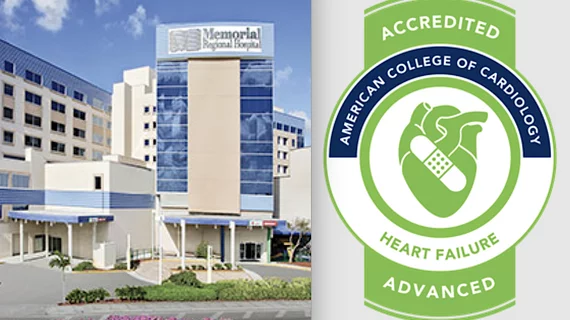Fourth U.S. hospital meets high criteria for advanced heart failure accreditation
Memorial Regional Hospital in Hollywood, Florida, recently becoming just the fourth hospital in the United States to earn Advanced Heart Failure Accreditation from the American College of Cardiology (ACC). The facility, home to the Memorial Cardiac and Vascular Institute, exceeded an array of stringent criteria during an onsite review of the staff’s ability to evaluate, diagnose, and treat patients with heart failure.
The other three facilities so far to gain ACC accreditation are Lutheran Hospital in Indiana, Union General Hospital in Georgia, and AdventHealth in Tampa, Florida.
To be accredited, the hospital needs to demonstrate its excellence through pre-hospital care, early heart failure patient stabilization, acute care, transitional care, clinical quality measures and other parameters. Memorial Regional is the only hospital in South Florida to earn the designation.
Through the Heart Failure Accreditation program, the ACC provides a supportive and collaborative approach to help hospitals treat heart failure patients. This includes guiding the facility through a gap analysis and preparing the center to work toward the adoption of and compliance with the latest guidelines. Accredited facilities have found that employing best practices and implementing other proven quality initiatives leads to greater operational efficiency and a more consistent approach to treatment throughout the continuum of care.
“The advanced certification wouldn’t be possible without the expertise of our physicians, team members, and the commitment to provide the highest quality patient and family-centered care to our patients,” said Peter Powers, Memorial Regional Hospital CEO in a statement. "We’re proud to be recognized as the leading cardiac program in South Florida."
There are fewer than 60 hospitals in the country that have received Heart Failure Accreditation from the ACC, with the aforementioned four the only ones from that group earning the advanced certification. Facilities must take part in a multi-faceted clinical process that involves completion of a gap analysis, examination of variances of care, development of an action plan, onsite review, and ongoing monitoring. Accredited hospitals have streamlined processes, implemented guidelines and standards, and adopted best practices that better educate patients, improve outcomes, and more effectively and efficiently control disease.

